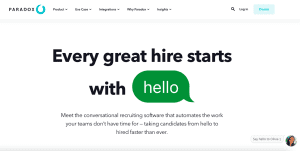
The forecasts are in, and economists paint a gloomy outlook for the UK economy in the coming months. It has been predicted that Britain risks being the first G7 nation to slip into recession – and the last one to get out of it – which is undoubtedly causing concern amongst business leaders.
To prepare for challenging times ahead, many organizations are already making tough decisions about where to prioritize investments as budgets tighten. According to new research from LinkedIn, three-quarters of business leaders in the UK are anxious that the current climate will force companies to wind back progress made during the pandemic on important areas of working life such as flexible work, as well as skills development (76%), and employee wellbeing (83%).
However, this is at odds with what professionals want and has the potential to significantly impact a company’s ability to attract and retain talent. LinkedIn’s Global Talent Trends report finds that flexible work is the biggest factor UK employees value in employers today, even before compensation, with skills development and work-life balance, also featuring high on the list.
Opportunity for recruiters
Despite the economic outlook, we’re still seeing a very active labor market with low unemployment levels and a healthy level of job vacancies – with the term ‘jobful recession’ being coined to describe the current climate.
However, with uncertainty front of mind for many, it has a knock-on effect on how people respond to new opportunities. LinkedIn labor market data reveals that job-seeking behavior in the UK is down compared to the first half of the year, suggesting that people are becoming increasingly reluctant to change jobs during this time of uncertainty. Furthermore, recent LinkedIn research found that 4 in 5 UK business leaders say it’s been difficult to attract talent in the current environment.
Recruiters play a pivotal role in helping businesses navigate labor market changes, but during periods of uncertainty like the one we’re collectively experiencing now, they have even more of an opportunity to play a strategic adviser role to clients. They are uniquely positioned to help reduce the disconnect between what candidates want and what many employers are now offering by helping companies understand what candidates need in order to consider and pursue new opportunities actively. This is particularly pertinent at a time when many businesses are struggling to find and recruit talent with specific skill sets needed to grow their organizations.
In a tough hiring environment where people are potentially sheltering in their roles and reluctant to make a change, recruiters can help companies make sense of the hiring market. Here are four key things recruiters should keep front of mind during this time:
Helping companies understand what candidates want
The pandemic has changed the world of work as we know it and shifted the needs and wants of employees. This means that it’s more important than ever for recruiters to understand what job seekers want. The biggest shift is the increased desire for greater flexibility in the workplace. For many job seekers now, flexible working arrangements are a deal breaker when considering a new role, let alone accepting one. Recent LinkedIn data highlights the growing preference amongst candidates for flexible working, showing that demand outstrips supply for remote roles – with remote roles making up less than 12% of job ads in the UK, but receiving more than 20% of applications.
Flexible working will be a key talent magnet for the foreseeable future and can be a core differentiator for recruiters when reaching out to candidates, so featuring an organization’s flexible working policies front and center is going to be key.
In addition to flexible working, LinkedIn’s recent Global Talent Trends report shows that skills development is a top priority for employees and job seekers. By highlighting a company’s commitment to skills development and the different L&D initiatives that are available, recruiters can help candidates see how a job move can help them develop new skills and progress in their careers.
Encouraging companies to think skills-first
For decades, candidates have been assessed on their formal education, experience, and previous job title, which has resulted in companies missing out on high-potential talent. There’s an opportunity for recruiters to help organizations transition to a skills-based hiring approach, where candidates are considered for their skills and future potential. This can help ease the challenges of recruiting in a tight labor market.
Our data shows that LinkedIn members globally have added 365 million skills to their profiles over the last year, up 43% compared to the previous year. By using skills to screen and search for candidates, rather than relying on direct previous experience, recruiters can help companies unlock new talent pools and source talent from non-traditional backgrounds, which may also help them to improve the diversity of their organization. In addition, recruiters that adopt a skills-based hiring approach will help companies take a ‘select in’ approach to their recruitment, actively bringing in candidates who might not have realized their skills qualified them for the role – rather than just filtering out unsuitable applications. Given we’re still seeing labor market tightness, drawing in new talent this way will be highly valued by businesses.
Bringing a company’s purpose, culture, and values to life
More than ever, job seekers are attracted to companies that align with their personal values. When looking for new roles today, it’s more common than not to see candidates challenge and evaluate where a company stands on particular issues they value most, such as DEI or environmental sustainability.
Recruiters, therefore, need to be well-versed in understanding a company’s purpose and values, ensuring these come through during the hiring process. Recruiters will also need to partner with companies to help them best highlight these attributes to job seekers through their employer branding.
Data-driven recruiting is the future
With so much change in the labor market, businesses are increasingly looking for partners who stand out from the crowd and can be truly consultative – providing them with actionable insights grounded in data.
This means there’s a huge opportunity here for recruitment firms to arm their teams with the right tools to source this data and the skills they need to be able to decipher it. By equipping their teams with these abilities, recruiters can earn a higher seat at the table, providing their clients with strategic advice on workforce planning.
There is no denying that these are challenging times, but recruiters have a right to be cautiously optimistic and can provide a huge amount of value to clients by playing a more advisory role. By providing counsel and guidance, recruiters can help organizations navigate a tough economic environment, unlocking new talent pools and successfully attracting top talent.
By Adam Hawkins, Head of Search & Staffing EMEA & LATAM, LinkedIn.



